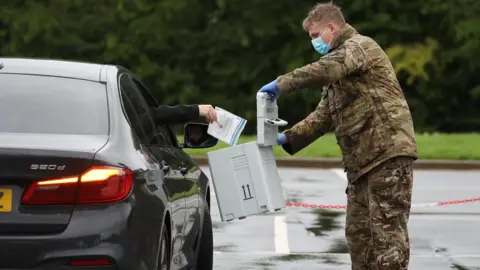Covid: Liverpool cases fell by 21% in mass testing pilot
 PA Media
PA MediaCovid-19 cases dropped by 21% compared with other areas during a mass testing pilot in Liverpool, research has shown.
People living or working in the city were offered tests whether or not they had symptoms from November to April.
More than 3,200 staff days among key workers were saved from being lost to quarantine through a test-to-release scheme, scientists said.
University of Liverpool's Prof Calum Semple said the pilot was "incredibly valuable" for future scenarios.
Liverpool had one of the highest infection rates in England when the city-wide testing scheme began in November.
The study, by the University of Liverpool and the Department for Health and Social Care, found that in six months, 283,338 people in the city took a lateral flow test.
The research revealed there was an 18% increase in case detection up to mid-December compared to other areas.
About 6,300 individuals who declared no symptoms tested positive, and researchers also suggested between 850 and 6,600 infections were prevented by the pilot.
The speed at which lateral flow results were available, compared to PCR tests which are analysed in labs, saved about a day in the time it takes to identify someone as likely to pass on the virus, scientists said.
However, the study showed that people living in deprived areas were less likely to take up testing.
Prof Sally Sheard, from the university, said there was a "very genuine fear" that they would lose income if they had to self-isolate.
She said it was a "learning point" with a need for prompt isolation payments.
A test-to-release pilot in early December invited police, fire and rescue and prison service staff to use lateral flow tests.
There were 709 key worker participants and 3,263 days of isolation had been saved by 3 March, researchers said.
Liverpool's director of public health, Matthew Ashton, said lateral flow mass testing schemes would provide the "opportunity to close down outbreaks at a much earlier stage".

Why not follow BBC North West on Facebook, Twitter and Instagram? You can also send story ideas to [email protected]
